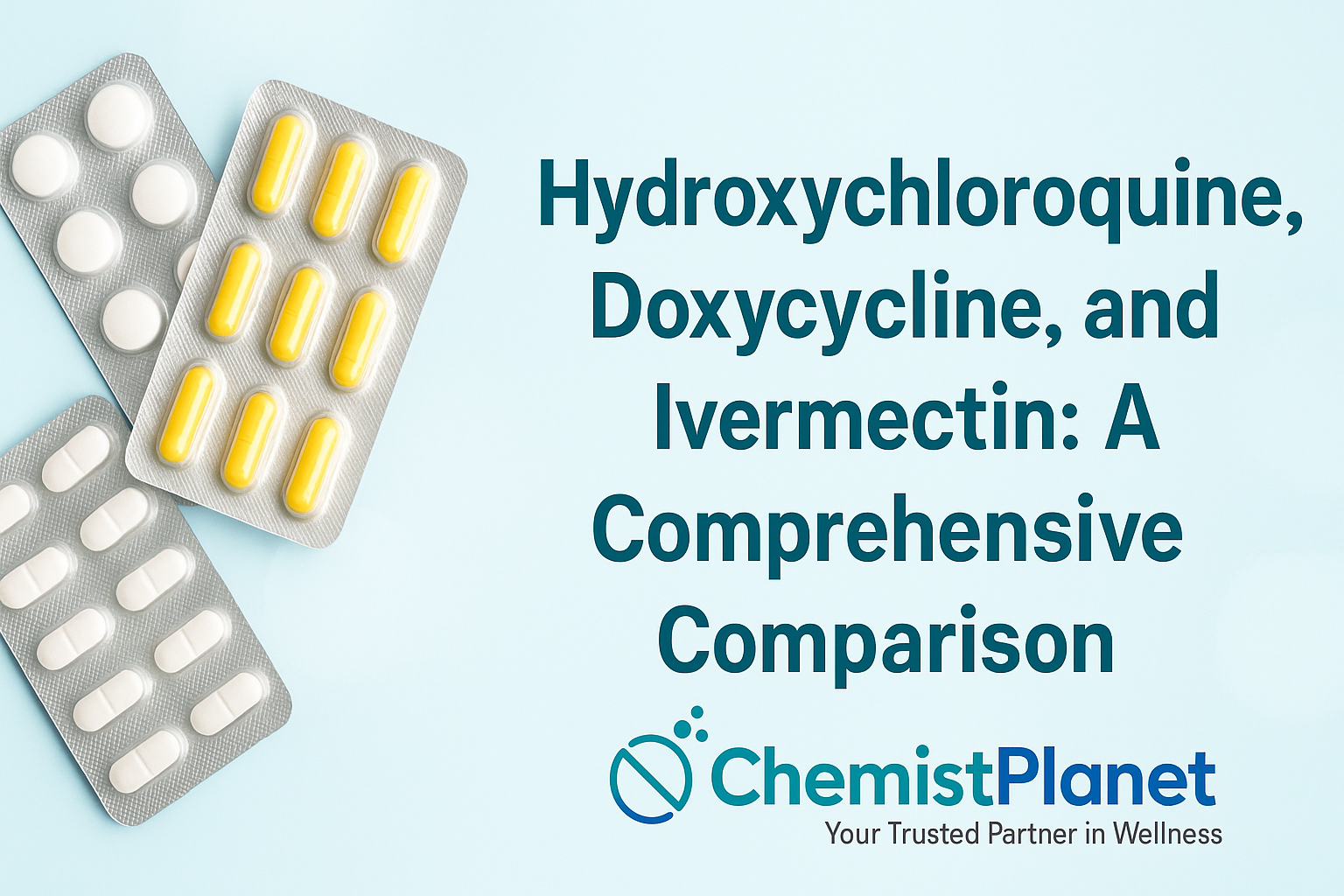
Hydroxychloroquine, Doxycycline, and Ivermectin: A Comprehensive Comparison
Three drugs that have drawn worldwide interest, particularly in recent years for their possible antiviral and antibacterial qualities include Hydroxychloroquine, Doxycycline, and Ivermectin. Every medication has its own particular applications, advantages, side effects, and debates. Whether you are a medical expert, a patient seeking knowledge, or simply someone curious about these drugs, this guide will offer a clear and succinct comparison to enable you to make educated choices.
Let us investigate the specifics and compare Hydroxychloroquine, Doxycycline, and Ivermectin in terms of similarities and differences.
Hydroxychloroquine is a prescription medication.
Originally developed as an antimalarial medication, hydroxychloroquine is now prescribed for autoimmune disorders like lupus and rheumatoid arthritis. It works by lowering inflammation and altering the immune system.
Main Applications:
- Treatment and prevention of malaria
- Autoimmune disorders including rheumatoid arthritis and lupus
- Examined as a possible therapy for viral infections (e.g., COVID-19)
- How It Works: By lowering the immune system’s activity, hydroxychloroquine lowers inflammation. In laboratory environments, it may also hinder the reproduction of some viruses.
Usual Negative Effects:
- Feeling sick
- Pain in the head
- Skin irritations
- Rarely, it could alter eyesight from retinal damage.
- Regular eye examinations should be used to track long-term usage.
Doxycycline is a tetracycline class broad-spectrum antibiotic.
Belonging to the tetracycline family, doxycycline is a broad-spectrum antibiotic. Often recommended for bacterial infections, it also has anti-inflammatory qualities.
Main Applications:
- Skin infections and acne
- Infections of the respiratory tract
- STIs
- Preventing malaria
- Lime disease and rosacea treated off-label
Doxycycline works by blocking the synthesis of proteins required for bacterial growth and multiplication. This prevents the virus from spreading.
Usual negative effects:
- Stomach discomfort
- Sensitivity to sunlight is photosensitivity.
- Loose stools
- Fungal infections
To avoid throat discomfort, always take it with a full glass of water and skip lying down right after.
What is Ivermectin?
Ivermectin is typically referred to as an antiparasitic drug. It treats several different parasite diseases in people and animals.
Main Applications:
- Lice in the head
- Scabie
- Onchocerciasis, or river blindness
- Intestinal parasites causing strongyloidiasis
- Looked at for antiviral qualities
Ivermectin kills and paralyzes parasites by disrupting their nervous system. It could also influence routes for viral replication.
Usual Negative Reactions:
- Lightheadedness
- Feeling sick
- Slight skin rash
- Rarely, neurological symptoms
- Dosage and frequency are mostly determined by the ailment being treated.
- Examining the three drugs
Characteristic-
Antimalarial, Immunomodulator; Doxycycline; Ivermectin; Hydroxychloroquine Antiparasitic drug
Primary Application Malaria, Autoimmune Bacterial Diseases Parasitic Illnesses
Using Antivirals Some studies’ off-label investigational use Under study Common Side Effects Nausea, vision changes Gastrointestinal distress, photophobia Rash, vertigo
Doctor’s orders needed Indeed, indeed, indeed
Which One Is Best for You?
Your particular situation, age, general health, and medical history will determine whether you choose Hydroxychloroquine, Doxycycline, or Ivermectin. Here are few things to think about:
Doxycycline is usually recommended for bacterial infections such as acne, respiratory infections, or Lyme disease.
If your illness is parasitic, normally choose Ivermectin.
Warning: These drugs should not be used without a prescription. Self-medication could cause problems, negative effects, or resistance.
What About COVID-19?
During the COVID-19 epidemic, all three medications drew notice. Their efficacy, however, is still debatable.
Hydroxychloroquine: Early research showed promise, but later clinical trials revealed mixed or negative outcomes. It is not usually advised for COVID-19 therapy any more.
Not a typical treatment; sometimes combined with other medications in early therapies.
Ivermectin: Some nations have shown rising interest in it, although major studies have not verified steady advantage.
Last Thoughts
Modern medicine values each of these drugs—Ivermectin, Doxycycline, and Hydroxychloroquine. They have various goals, hence under medical supervision they should only be utilized. Though safety and correct use should always come first, internet pharmacies like Chemist Planet have made it easier than ever to get prescription drugs.